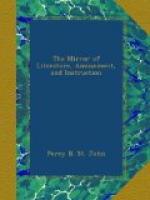“With broken lyre, and cheek serenely pale.”
Coleridge, dropping “some natural tears,” on viewing the altered features of his native valley; sweetly and affectionately telling of
“The meadow, and its babbling brook,
Where roses in the ripple shook.”
Southey, forgetting the ungentler theme of “battle field” amidst the sublimity of rock and lake. Campbell, pouring from his plaintive shell a tender eulogy to his northern home—a glowing tissue of
Dreams of the Highland mountains, and
echoing streams,
And broken glades, breathing their balm.
—Scott, terrifically depicting a Sassenagh tournament, or inditing a stirring appeal to the “blue bonnets,” to settle some Border broil. James Hogg, “the Scottish Virgil,” on whom has surely fallen the mantle of inspiration from the Mantuan bard, coming forth in all the richness of the “Noctes Ambrosianae,” from the misty hill where he dominates “the king of shepherds.” Delta, elegantly pensive, sighing beneath the blighted trees which flourished over his boyhood; and listening to the rhetoric of the changing seasons. Alaric Watts, “the fireside bard,” giving us a touching apostrophe to his “youngling of the flock,” in melting verse, warm from that kindred fancy
“Whose
blessed words
Can bid the sweetest dreams arise;
Awaken feeling’s
tenderest chords,
And drown in tears of joy the eyes.”
T.K. Hervey, following in the same bright path, or enthusiastically rapt amidst the beauty and bloom of Australia.—Bernard Barton, bringing us snatches of vernal philosophy, gathered in the silence of murky woods, and the solitude of perfumed meadows.—John Clare, swearing everlasting fealty to his beauteous Mary, by the elm-shadowed cottage of her bowery home; thanking heaven for the benison of love and rurality.—Richardson, the poet of India, sonnetizing amidst the superb cupolas and temples which gem the banks of the deified Ganges, longing to exchange his fevered abode for salubrious England.—Pringle transforming the repulsive features of a South African desert into matter for piteous song; and illumining, by the brightness of his genius, the terrible picture of Caffre barbarity and degradation.—Roscoe, revelling in the sweets of Italian lore, his own lips “touched with a live coal” from the altar of poesy.—Washington




